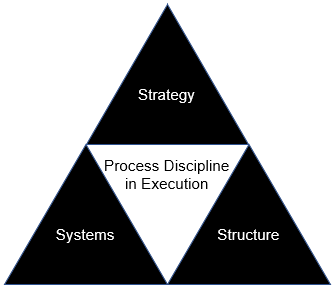
The lack of process discipline to structure and systems in executing the strategy of a business results in higher costs, lower profits, and tight cash flow.
Inefficiency arises from the wasted effort by employees failing to be disciplined in their work processes, leading to waste in material and equipment utilization. Put the structure in place with the supporting systems to execute the strategy with the standards established in the profit plan to stop the waste.
Overview
To provide the best value to your customers, you need your operations to have process discipline. Through process discipline, you can best manage your variable and fixed costs. The challenge with maintaining process discipline lies with the tradeoffs customers can force upon you if you want their business.
Managing the tradeoff between process discipline and customer responsiveness is one of the toughest choices in business. Overcoming this challenge is balancing the tradeoff of operational efficiency with customer demand.
The tradeoff is particularly difficult when your target customer’s needs don’t align cleanly and efficiently with your established workflows and operating procedures. It’s like asking for water from the desert. Should you hijack your work process to meet the needs of the customer, or should you turn the customer away by telling them that you can’t meet their needs because it is outside your company’s scope?
Process discipline is maintained when changes to written or unwritten policies require those on the sales side of the organization to know who on the operating side has the power to decide whether a process should be hijacked or a special workaround. This is particularly true when it involves retaining a valued customer.
Another issue with process discipline is seen in highly bureaucratic organizations that make it impossible for the people on the front line to accommodate the customer that they simply give up and fall back to it’s “company policy,” so they don’t put their jobs at risk. Employees who stop thinking about what’s in the best interest of their employer and the customer work 100% of the time for businesses that make less money than they should.
The best companies create a culture that helps employees be “problem solvers’ who are invested in the success of the business and their customers. People who do this know that not every customer demand should be honored. They also know that allowing employees to honor reasonable requests without management permission leads to employees willing to go that extra mile.
Failure to help your employees feel empowered to do what is in the best interest of the customer and, ultimately, their company and their careers is a mistake. Your business will make more money when ownership and management recognize that in the pursuit of great business, everyone involved needs a chance to win.
